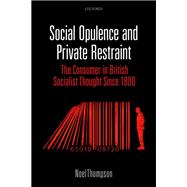Social Opulence and Private Restraint The Consumer in British Socialist Thought Since 1800
, by Thompson, Noel- ISBN: 9780199646012 | 0199646015
- Cover: Hardcover
- Copyright: 10/1/2015
Social Opulence and Private Restraint is a study of the place of the consumer and consumption in the political economy of British socialism, from its early-nineteenth-century origins, through 'New Times' Marxism, to the consumer-focused New Labourism and political economies critical of consumerism that can be found in the late-twentieth and early-twenty-first-century Left. Noel Thompson identifies and explicates recurrent themes which cross the boundaries of the conventional periodisation of the history of British socialist thought; themes which illustrate the sustained nature of the multifaceted ideological challenge presented by the accommodation of the consumer within socialist political economy.
This challenge necessitates an engagement with the character and priorities of a future socialist society. As such it touches on some of the key issues which socialists have confronted in pursuit of their vision of a good society: issues with a strong contemporary relevance such as the desirability of private as against social opulence; the relationship between consumption and happiness; the need to educate and/or to liberate desire; and, in particular, the environmental and social consequences of rising levels of consumer expectation and consumption. The study also throws light on how the disparate ways in which these issues were addressed reflected and shaped the socialist political economies that emerged in the nineteenth and twentieth centuries, while also engendering tensions between them.
This challenge necessitates an engagement with the character and priorities of a future socialist society. As such it touches on some of the key issues which socialists have confronted in pursuit of their vision of a good society: issues with a strong contemporary relevance such as the desirability of private as against social opulence; the relationship between consumption and happiness; the need to educate and/or to liberate desire; and, in particular, the environmental and social consequences of rising levels of consumer expectation and consumption. The study also throws light on how the disparate ways in which these issues were addressed reflected and shaped the socialist political economies that emerged in the nineteenth and twentieth centuries, while also engendering tensions between them.






